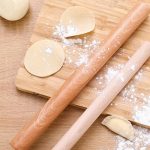When it comes to baking, every tool in your kitchen plays a crucial role in achieving the perfect dough. The rolling pin, a staple in baking, is essential for flattening and shaping dough efficiently. However, the choice of material for a rolling pin can significantly impact your experience and results. While rolling pins come in various materials, the kind of wood you select can influence not just performance, but also aesthetics and durability. This article will explore the best wood for rolling pin and help you understand which type stands out.
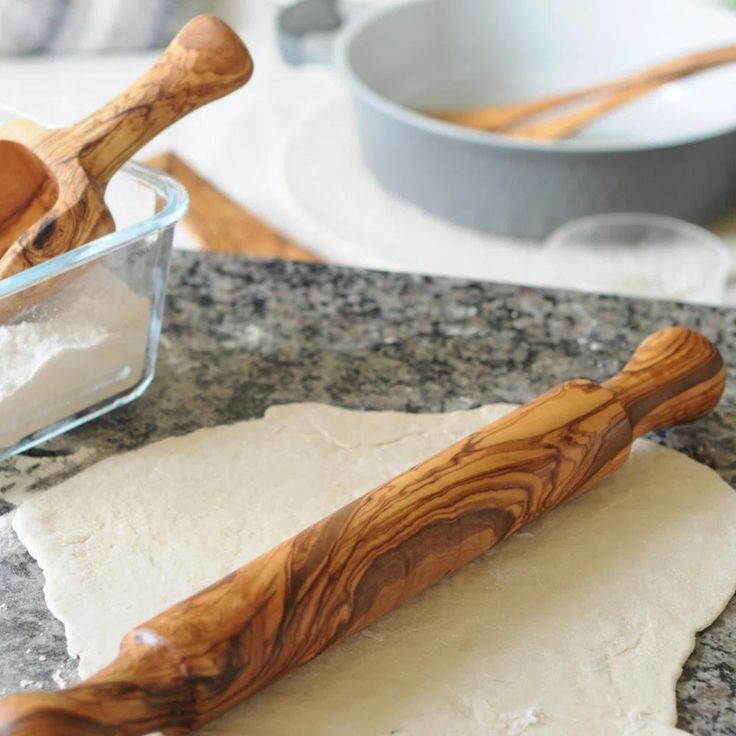
Understanding the Importance of Wood Type in Rolling Pins
Choosing the right wood for a rolling pin isn’t merely a matter of preference; it directly affects functionality, ease of use, and maintenance. Different types of wood possess unique physical properties, which impact how they handle dough. For example, some woods have a natural non-stick quality, making your rolling experience smoother while minimizing the need for excess flour.
Additionally, the wood you choose can affect the flavor of your baked goods. Certain woods, particularly when used for rolling out savory pastry doughs, can impart pleasant undertones that enhance flavor. Furthermore, durability is a crucial factor. You want a rolling pin that stands the test of time—one that won’t warp or crack after repeated use. Understanding these aspects helps you appreciate why selecting the right wood matters.
Maple: The Top Contender for Rolling Pins
When discussing the best wood for rolling pins, maple consistently emerges as a top contender. This hardwood combines durability and a fine grain that minimizes moisture absorption. Its smooth surface provides an excellent base for even rolling, ensuring your dough remains consistent in thickness.
Maple features a moderate to high density, allowing it to withstand frequent use without compromising shape or structure. Moreover, chefs love maple because it possesses a slight natural oil content. This quality helps reduce stickiness, enhancing the rolling experience. Bakers will appreciate the ease of washing and maintaining a maple rolling pin; its resistance to wear and tear means fewer replacements over time.
However, it’s essential to choose the right type of maple. Hard maple is preferable for rolling pins over soft maple due to its denser and more durable properties. Whether you’re rolling out pie crusts or cookie dough, a hard maple rolling pin will become a reliable kitchen companion that delivers consistent results.
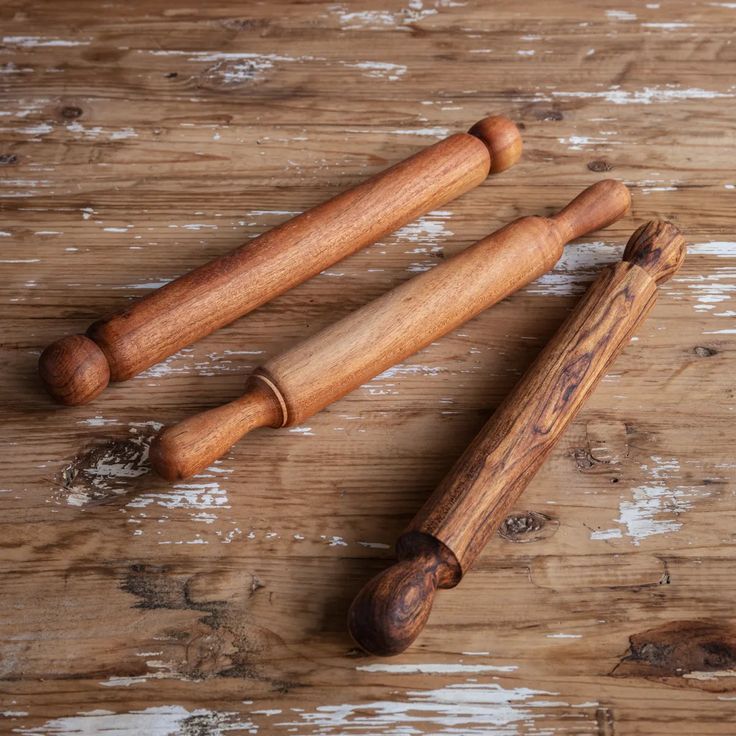
Beech Wood: A Strong and Affordable Option
Beech wood serves as an excellent alternative to maple and is growing in popularity due to its affordability and strength. Highly durable, beech possesses an attractive pale color that fits seamlessly into any kitchen décor. Many chefs praise its smooth texture, which makes it easy to roll out dough without excessive sticking.
The grain of beech is even and fine, ensuring that it rolls out dough consistently, making it a favorite among bakers. Beech wood also has a natural resistance to absorbing odors and flavors, making it versatile for various types of dough—from delicate pastry to hearty bread.
However, beech does require more maintenance than maple. Without proper care, it can become porous over time. It is crucial to wash beech wood promptly and to oil it regularly to ensure its longevity. When cared for properly, a beech rolling pin will be an affordable and dependable tool in any kitchen.
Walnut: A Luxurious Choice for Aficionados
Walnut wood adds a touch of elegance and luxury to any kitchen. Its rich, dark color and exquisite grain patterns draw attention, making it not just a tool, but also a stunning kitchen accessory. Beyond aesthetics, walnut boasts excellent durability, making it suitable for heavy rolling work.
Walnut’s density and natural oils give it a naturally non-stick surface. Bakers love how it reduces friction, allowing for easy dough manipulation. The fantastic result is that it minimizes the amount of flour needed, making for a cleaner working surface. The luxurious feel of walnut can elevate the baking experience, turning a simple task into something special.
An important consideration is that walnut is more expensive than other hardwoods, such as maple or beech. While it may not be the most budget-friendly option, many bakers consider it a worthwhile investment. Additionally, walnut requires proper care and maintenance to preserve its condition—oiling regularly ensures its smooth surface and enhances its lifespan.
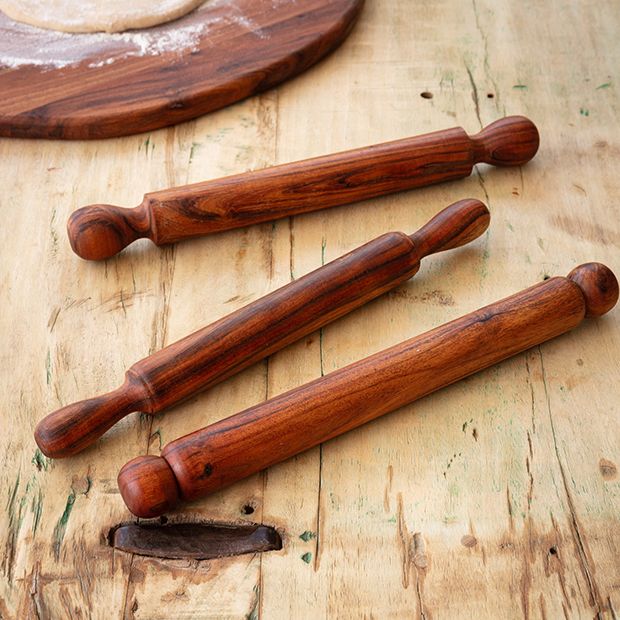
Cherry Wood: A Balance of Beauty and Function
Cherry wood ranks high among the most visually appealing options for rolling pins. Often featuring a stunning reddish hue and a subtle sheen, cherry wood stands out as one of the most beautiful choices. This wood not only offers aesthetics but also delivers excellent functionality.
Like other hardwoods, cherry possesses strength and durability. It boasts a similar density to maple, providing a sturdy foundation for rolling dough effectively. Cherry wood’s fine grain enables a smooth surface that rolls out dough evenly while resisting stickiness. Many bakers appreciate cherry wood for its ability to establish a non-stick surface when seasoned properly.
One unique aspect of cherry wood is how it evolves over time. As it ages, the color deepens, allowing the rolling pin to develop a beautiful patina. This transformation adds character to the tool, often making it a cherished family heirloom. Overall, cherry wood combines beauty and practicality, making it a strong contender for best wood for rolling pins.
Oak: Durability and Longevity
Oak wood deserves mention for its durability and rugged nature. Known for its dense grain and sturdiness, oak can withstand significant wear and tear, making it a great option for those who bake frequently. While oak may not be as smooth as maple or walnut, it compensates with exceptional strength.
The grain of oak allows it to hold up well against scratches and dings. Many bakers find that its rougher surface can help grip the dough better, aiding in the rolling process. However, it’s essential to consider the potential for sticking; using a little more flour may be necessary with oak.
In terms of maintenance, oak requires regular oiling to keep it in good shape and prevent cracking. Given its density, oak rolling pins can be heavier than those made from other woods. While they might require some physical effort, their durability makes them a lifelong investment for avid bakers.
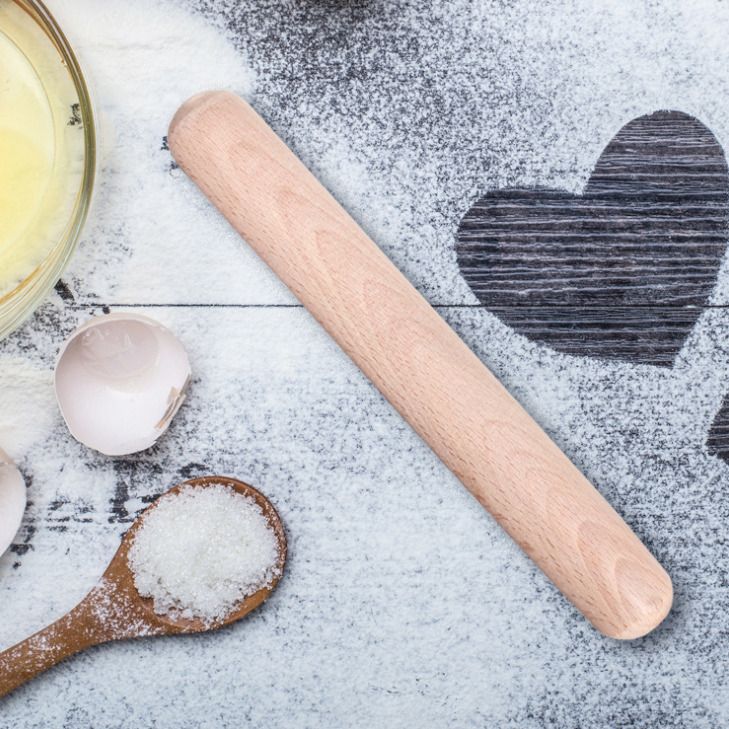
Bamboo: A Sustainable and Unique Choice
Bamboo emerges as a sustainable alternative that many eco-conscious bakers appreciate. This material is technically a grass, and it significantly differs from hardwoods but offers outstanding benefits worth considering. Bamboo rolling pins are lightweight yet incredibly durable, making them easy to handle during baking tasks.
One significant advantage of bamboo is its natural resistance to bacterial growth, which is especially important for food safety. The non-porous surface of bamboo means that it does not absorb moisture, odors, or flavors, ensuring your baked goods taste just like they should.
However, bamboo may not have the same level of longevity as hardwood options. It requires gentle care; washing with warm, soapy water and not soaking it is essential for maintenance. Many bakers find bamboo rolling pins functional, lightweight, and easy to store, making them a fantastic addition to any kitchen.
Factors to Consider When Choosing the Best Wood for Rolling Pins
While understanding the various wood types is crucial, several factors can guide you in choosing the best wood for your rolling pin based on your specific needs.
First, consider the frequency of use. If you bake often, opt for dense woods like maple or walnut. These will withstand repeated use better than softer woods. On the other hand, if you bake only occasionally, materials like bamboo or beech may suit your needs without breaking the bank.
Next, evaluate the style of baking you do most. If you frequently handle sticky doughs, select woods known for their non-stick properties, such as walnut or cherry. If you are making artisan bread or thicker pastries that require more strength, choose something sturdier like oak.
Weight is another important factor. Heavier rolling pins provide stability, making them easier to control, while lighter options allow for easier maneuverability. Ensure to select a weight that feels comfortable for you during use. Finally, consider the maintenance required for the wood. Some woods demand more care and upkeep than others, which may influence your decision.
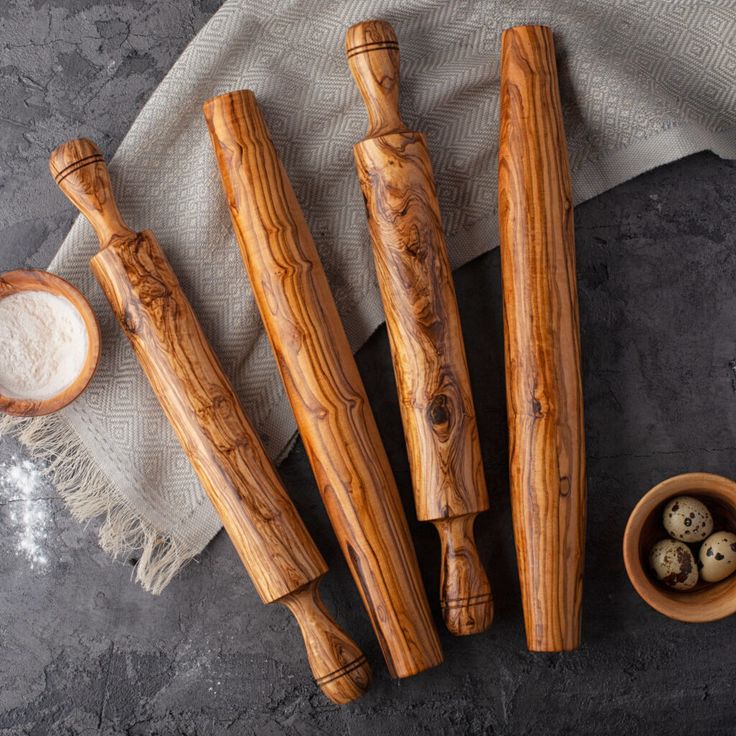
Caring for and Maintaining Your Wooden Rolling Pins
Once you’ve chosen your wooden rolling pin, understanding its care and maintenance is critical to ensure its longevity. Taking proper care of your rolling pin can prevent splits, cracks, and loss of functionality.
First, always wash wooden utensils using warm water and gentle soap. Avoid soaking your rolling pin, as prolonged exposure to water can lead to warping. After washing, dry it immediately with a soft cloth to remove moisture.
To enhance the durability of your rolling pin, regularly apply mineral oil or food-safe wood conditioner. This process helps keep the wood from drying out and cracking. Aim to condition your rolling pin every few months or as needed, especially if you notice the wood appearing dull or dry.
In addition, store your rolling pin in a dry place, ideally upright or cushioned in a drawer. Avoid leaving it in direct sunlight or near a heat source, as this can lead to warping and cracking. Consistent care will ensure that your wooden rolling pin not only retains its functionality but also remains an attractive kitchen accessory for years to come.
Conclusion: Finding the Best Wood for Your Rolling Pin
In the vast world of baking tools, selecting the best wood for rolling pin is an essential step that impacts your culinary journey. Each type of wood offers unique benefits and challenges, affecting your baking experience. The standout choices—maple, beech, walnut, cherry, oak, and bamboo—each provide distinct characteristics suited to different baking styles and preferences.
By understanding how the choice of wood influences performance, aesthetics, and durability, you empower yourself to make an informed decision. Whether you prioritize beauty, functionality, or sustainability, there’s a wooden rolling pin that’s perfect for your needs. Ultimately, the best wood for your rolling pin is one that complements your baking style, enhances your experience, and delivers consistent, delicious results. Investing in a quality rolling pin will prove invaluable as you explore the delicious realm of baking, allowing you to create delightful treats with ease and joy.

